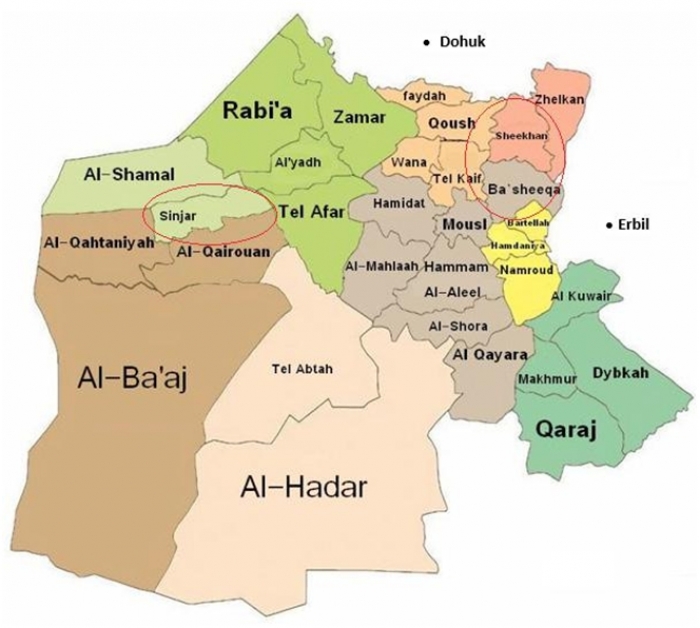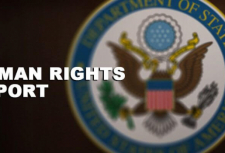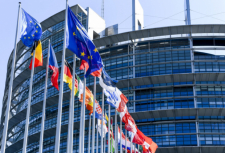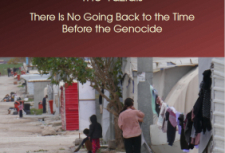The Yazidis-Perceptions of Reconciliation and Conflict

(Excerpts from the report)
In the report, the authors proposed a map with a description of the Yazidi districts (circled)*
Researchers Dave van Zoonen and Khogir Wirya from the Meri Research Institute in 2017 prepared a report called " Yazidis. Perception of reconciliation and conflict". This Middle East research institute, Meri, deals with political issues that contribute to the process of nation-building and democratization in the Middle East.
The authors of the report are Khogir Wirya and Dave van Zoonen.
Dave van Zoonen was a researcher at Mary. His research focuses on Iraq's security sector, transitional justice, and intercommunal reconciliation. He holds a Master's degree from the Free University of Amsterdam.
Khogir Wirya is a researcher at Meri. He holds a Master's degree from the University of Nottingham in the United Kingdom, and has been active in the study of conflict resolution in Iraq in general and in the disputed territories in particular.
According to the report's authors, " This study aims to promote and promote good governance, human rights, the rule of law, and socio-economic prosperity in the region.
Dave van Zoonen and Khogir Wirya in the report ask questions that are important for understanding what is happening to the Yazidi community around the world: Who are the Yazidis? What does reconciliation mean for the Yazidi community in Iraq? And what are the concepts of reconciliation for one of the largest minority groups in Iraq?
The authors of the report argue in the report that the attitudes of the Yazidi community in Iraq in the concept of reconciliation are particularly relevant to the future stability of Iraq. Focusing on the question of what reconciliation means for the Yazidi community in Iraq, this study aims to identify the historical and more recent difficulties of this people, internal and intercommunal conflicts, and tensions, and to uncover the communal perspectives of conflict and reconciliation.
This report begins by emphasizing the need to avoid imposing assumed definitions of reconciliation in the context of the Yazidis. Dave van Zoonen and Khogir Wirya note that "peacemakers and those involved in reconciliation efforts following the 2014 ISIL terrorist group attack should be careful about using the term 'reconciliation' and clearly understand what they mean by this term in their programs."
In addition to mentioning Yazidism, the researchers identified two factors that largely determined the socio-economic status of Yazidis:
1) Their identity as an ethno-religious minority in the Iraqi government system
2) The ongoing land disputes and competition for resources between Baghdad and Erbil.
The results of this study show that the Yazidis suffer from internal and external conflicts. External conflicts - this is to date an attack by IS, the mistreatment and sexual enslavement of Yazidis has caused significant damage to relations between Yazidis and the region's Sunni Arabs. In addition, the KRG and the Iraqi Government do not appear to enjoy a favorable position among the Yazidis; the KRG is mostly focused on its own agendas, while the Iraqi Government neglects the Yazidis. Within the country, the Yazidi minority is beginning to see itself as a separate ethnic group, rather than Kurds. This feeling has grown among the people in Shangal. There is also a gap between the community and the political representatives. Many Yazidis do not feel represented in the political life of the country. In addition, the presence of a significant number of Yazidi-backed armed groups in the Nineveh Plain could lead to worrying tensions between the Yazidi community and the KRG.
In 2016, the authors were interviewed for this report as part of a study funded by the American Institute of Peace (USIP). The results of this study were brought to the attention of the USIP and are now available to a wider audience as a service to those who seek to assess the extent to which the problems of the Yazidis are being addressed after the defeat of IS in Nineveh. The results of this study are a form of documenting the plight of the Yazidi community in Iraq.
In the report, the authors proposed a map with a description of the Yazidi districts (circled):
In conclusion, the researchers concluded that, " despite its widespread rhetoric about post-conflict stabilization, the meaning of the key concept of the word "reconciliation" often remains unclear. Conceptual clarity regarding reconciliation can only be achieved by analyzing the context in which it will take place, without excluding an understanding of the view of the Yazidi community. In the absence of a definitive definition, international peacekeepers and local authorities seeking to improve intercommunal relations risk imposing preconceived notions of reconciliation that do not fit well into the local context and are doomed to failure from the outset. By interviewing twenty community leaders from a wide range of backgrounds and supplementing this sample with two focus groups, this study contributes to increasing knowledge about the local perception of reconciliation."
The results of the study by Dave van Zoonen and Khogir Wirya confirm some of the conclusions presented in the reports of other international human rights organizations. Respondents expressed needs and concerns like those expressed in reports published by the Minority Rights Group and other organizations. Most importantly, the attack by the IS terrorist group not only damaged relations between the Yazidis and the Sunni Arab community, but also strained relations between the Yazidis and the government authorities. Consequently, the Yazidis need to come to terms with three groups: the central Government of Iraq, the Kurdistan regional Government, and the Sunni Arab community. Despite the obvious differences between them, there is one problem in all three cases: the relationship is characterized by a serious lack of trust.
Dave van Zoonen and Khogir Wirya note that reconciliation is a long-term process that takes years, if not decades, to produce meaningful results. Perhaps, therefore, it is not surprising that Yazidis tend to adhere to a minimalist (subtle) conceptualization of reconciliation. Reconciliation initiatives that focus on minimalist elements, such as coexistence and ending violence, are more likely to be positively received by the Yazidi community than initiatives that focus on more maximalist elements, such as forgiveness. When reconciliation is linked to forgiveness, many Yazidis still reserve the right not to reconcile.
Link to the report: usip.org
Tags: #yazidisinfo #newsyazidi #aboutyazidi #yezidofiraq
The Yazidis-Perceptions of Reconciliation and Conflict

(Excerpts from the report)
In the report, the authors proposed a map with a description of the Yazidi districts (circled)*
Researchers Dave van Zoonen and Khogir Wirya from the Meri Research Institute in 2017 prepared a report called " Yazidis. Perception of reconciliation and conflict". This Middle East research institute, Meri, deals with political issues that contribute to the process of nation-building and democratization in the Middle East.
The authors of the report are Khogir Wirya and Dave van Zoonen.
Dave van Zoonen was a researcher at Mary. His research focuses on Iraq's security sector, transitional justice, and intercommunal reconciliation. He holds a Master's degree from the Free University of Amsterdam.
Khogir Wirya is a researcher at Meri. He holds a Master's degree from the University of Nottingham in the United Kingdom, and has been active in the study of conflict resolution in Iraq in general and in the disputed territories in particular.
According to the report's authors, " This study aims to promote and promote good governance, human rights, the rule of law, and socio-economic prosperity in the region.
Dave van Zoonen and Khogir Wirya in the report ask questions that are important for understanding what is happening to the Yazidi community around the world: Who are the Yazidis? What does reconciliation mean for the Yazidi community in Iraq? And what are the concepts of reconciliation for one of the largest minority groups in Iraq?
The authors of the report argue in the report that the attitudes of the Yazidi community in Iraq in the concept of reconciliation are particularly relevant to the future stability of Iraq. Focusing on the question of what reconciliation means for the Yazidi community in Iraq, this study aims to identify the historical and more recent difficulties of this people, internal and intercommunal conflicts, and tensions, and to uncover the communal perspectives of conflict and reconciliation.
This report begins by emphasizing the need to avoid imposing assumed definitions of reconciliation in the context of the Yazidis. Dave van Zoonen and Khogir Wirya note that "peacemakers and those involved in reconciliation efforts following the 2014 ISIL terrorist group attack should be careful about using the term 'reconciliation' and clearly understand what they mean by this term in their programs."
In addition to mentioning Yazidism, the researchers identified two factors that largely determined the socio-economic status of Yazidis:
1) Their identity as an ethno-religious minority in the Iraqi government system
2) The ongoing land disputes and competition for resources between Baghdad and Erbil.
The results of this study show that the Yazidis suffer from internal and external conflicts. External conflicts - this is to date an attack by IS, the mistreatment and sexual enslavement of Yazidis has caused significant damage to relations between Yazidis and the region's Sunni Arabs. In addition, the KRG and the Iraqi Government do not appear to enjoy a favorable position among the Yazidis; the KRG is mostly focused on its own agendas, while the Iraqi Government neglects the Yazidis. Within the country, the Yazidi minority is beginning to see itself as a separate ethnic group, rather than Kurds. This feeling has grown among the people in Shangal. There is also a gap between the community and the political representatives. Many Yazidis do not feel represented in the political life of the country. In addition, the presence of a significant number of Yazidi-backed armed groups in the Nineveh Plain could lead to worrying tensions between the Yazidi community and the KRG.
In 2016, the authors were interviewed for this report as part of a study funded by the American Institute of Peace (USIP). The results of this study were brought to the attention of the USIP and are now available to a wider audience as a service to those who seek to assess the extent to which the problems of the Yazidis are being addressed after the defeat of IS in Nineveh. The results of this study are a form of documenting the plight of the Yazidi community in Iraq.
In the report, the authors proposed a map with a description of the Yazidi districts (circled):
In conclusion, the researchers concluded that, " despite its widespread rhetoric about post-conflict stabilization, the meaning of the key concept of the word "reconciliation" often remains unclear. Conceptual clarity regarding reconciliation can only be achieved by analyzing the context in which it will take place, without excluding an understanding of the view of the Yazidi community. In the absence of a definitive definition, international peacekeepers and local authorities seeking to improve intercommunal relations risk imposing preconceived notions of reconciliation that do not fit well into the local context and are doomed to failure from the outset. By interviewing twenty community leaders from a wide range of backgrounds and supplementing this sample with two focus groups, this study contributes to increasing knowledge about the local perception of reconciliation."
The results of the study by Dave van Zoonen and Khogir Wirya confirm some of the conclusions presented in the reports of other international human rights organizations. Respondents expressed needs and concerns like those expressed in reports published by the Minority Rights Group and other organizations. Most importantly, the attack by the IS terrorist group not only damaged relations between the Yazidis and the Sunni Arab community, but also strained relations between the Yazidis and the government authorities. Consequently, the Yazidis need to come to terms with three groups: the central Government of Iraq, the Kurdistan regional Government, and the Sunni Arab community. Despite the obvious differences between them, there is one problem in all three cases: the relationship is characterized by a serious lack of trust.
Dave van Zoonen and Khogir Wirya note that reconciliation is a long-term process that takes years, if not decades, to produce meaningful results. Perhaps, therefore, it is not surprising that Yazidis tend to adhere to a minimalist (subtle) conceptualization of reconciliation. Reconciliation initiatives that focus on minimalist elements, such as coexistence and ending violence, are more likely to be positively received by the Yazidi community than initiatives that focus on more maximalist elements, such as forgiveness. When reconciliation is linked to forgiveness, many Yazidis still reserve the right not to reconcile.
Link to the report: usip.org
Tags: #yazidisinfo #newsyazidi #aboutyazidi #yezidofiraq


























